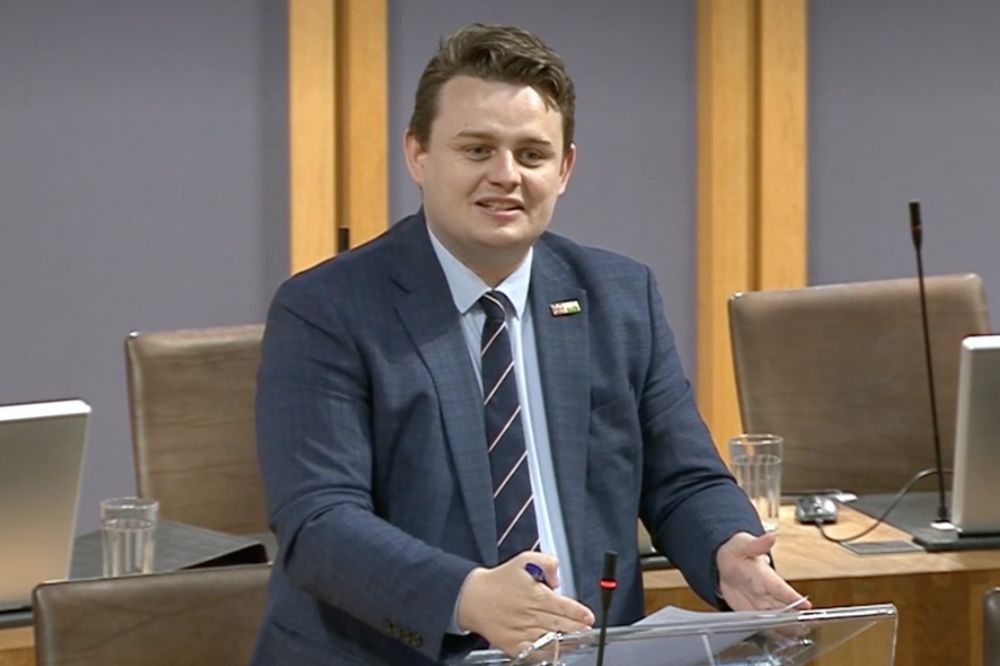Shadow minister makes urgent call for more Welsh medium primary schools

Emily Price
The shadow education minister has made urgent calls for more Welsh medium primary schools in order to help the government successfully tackle its goal of 1 million Welsh speakers by 2050.
During a statement on Welsh-medium education through late immersion in the Senedd on Tuesday (October 8), Tom Giffard said that increasing the number of Welsh primary schools would make immersion centres less needed in the future.
The second language Welsh speaker said that in his own town of Porthcawl, there is no option to send children to a Welsh medium primary school.
Opening his speech to the Chamber in Welsh, the Conservative MS said the language “belongs to everyone”.
Choice
He said: “It’s important that everyone feels that there is an opportunity for them to speak Welsh and to access education through the medium of Welsh.
“It doesn’t matter if you’re from a Welsh-speaking family or a Welsh-speaking community. The fact that everyone can have that choice to access Welsh education, to speak Welsh and develop Welsh language skills is important.”
The Cabinet Secretary for Education Lynne Neagle praised the work of immersion centres saying demand for late provision had continued to grow.
The intensive Welsh language learning programme for youngsters provides an alternative route to Welsh-medium education for those who may have missed out on Welsh language opportunities in childcare, nursery settings and school.
Learners with little or no Welsh can engage with the programme for up to twelve weeks whilst continuing contact with their home school until they’re ready to continue their education through the medium of Welsh.
Locations
There are currently 26 immersion centres supporting primary school learners and 16 centres supporting secondary school pupils as well as teachers visiting individual schools to support immersion provision.
Mr Giffard questioned the locations of the immersion centres suggesting that it would be better to place them in areas with fewer Welsh speakers.
The cabinet secretary for education said that in terms of the geography of the centres, it was important that they are available across all parts of Wales.
Access
She said: “In places like my constituency, Torfaen, which would be similar to Flintshire in terms of demographic, we’ve got the primary unit, but there are other authorities where they’ve got very well established immersion centres; they’ve got it at primary and secondary school.
“So, I don’t think it is a one-size-fits-all, and I think it is about responding to the need in the community, really, but we see this as a growing area and one that we want to build on, which is very important for everyone to have access to.”
The Welsh Government’s target of 1 million Welsh speakers could become law following the publication of the Welsh Language and Education Bill earlier this year.
Mr Giffard said meeting the target would be difficult without enough teachers to teach in the Welsh language.
The shadow education minister said: “We heard evidence from teaching unions last week in the education committee that raised severe concerns about the availability of staff.
“All agreed with the principle of the Bill, but felt that it would be difficult to deliver unless we had a long-term plan to increase the number of teachers that were able to teach in the Welsh language.”
Challenge
Ms Neagle said she was aware of “challenging” work force issues facing Welsh medium education but added that immersion centres will play a part in tackling the problem.
She said: “We’ve got our Welsh in education workforce plan, and I was discussing with the Cabinet Secretary for Finance and Welsh Language yesterday some of the challenges around workforce and the Bill that’s being taken forward.
“You’ll be aware that we’ve got things like incentives to come and be a Welsh-medium teacher, but we’re constantly reviewing what more we can do.”
To date the Welsh Government has invested £8.8 million to support late immersion provision in local authorities with 4000 learners benefiting from the programmes so far.
Ms Neagle said: “One of the things I’ve been struck by with the late immersion centres is that they’re not just for children who haven’t had any exposure to Welsh and need to get up to speed, they are also for children and young people who need to improve their confidence and their fluency in Welsh.
“I think that’s really important, especially after the pandemic, because we know that particularly children from English-speaking homes lost some of their language confidence during the pandemic.”
Support our Nation today
For the price of a cup of coffee a month you can help us create an independent, not-for-profit, national news service for the people of Wales, by the people of Wales.






Good to see sensible discussion on Welsh language provision by both Tories and Labour. The truth is, more of BOTH are required, Welsh -medium primary schools AND immersion centres
How ironic hearing Conservative Shadow Education Minister Tom Giffard calling for more Welsh medium primary schools to tackle the goal of 1 million speakers by 2050 seeing Tory policy for Wales since time immemorial was usually. Welsh Not!
#1997DevolutionReferendumNot #2006RichardRodgersSeneddChamberNot #2011LegislativeSeneddReferendumNot #HS2ConsequentialNot #M4ReliefRoadNot #Criminal&YouthJusticeSystemNot #PolicingNot #SaintDavidDayBankHolidayNot #AirTaxDutyNot #CrownEstateNot #FullWaterPowersNot #20MPHDefaultSpeedLimitNot
Let’s not forget, insufficient though it is, it was the Tories that brought in the 1993 Welsh Language Act that received no support whatsoever from Labour. At the time it was Rhodri Morgan who defended Labour’s stance stating that when they got into power again they’d do the job properly. We’re still waiting, and present policy is still largely based on the 1993 legislation, plus the Senedd’s equally insufficient Welsh Language Measure of 2011. It was also the Tories that made Cymraeg a compulsory subject to age 16 for all children under the provisions of the 1988 Education Reform Act… Read more »